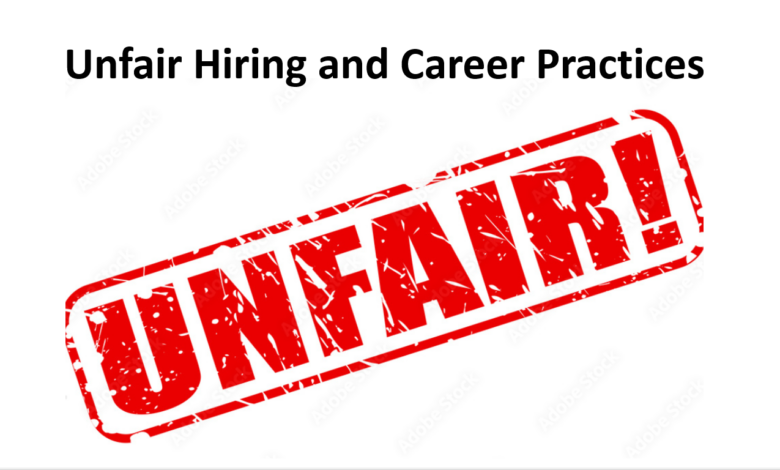Unfair Hiring and Career Practices that have been Normalized – We need to stop this for a sustainable future of work!
Global Unfair Hiring and Career Practices that have been Normalized

We live in a constantly changing world where people tend to always incline to changing things for the better. It pains a lot to realize that despite a lot of changes for the better, there are still some hiring and career practices that are still causing more harm than good.
The painful truth is that the world has and is normalizing such practices. I am here to list such with the intention that someone somewhere will see this and fuel it for change. Also it is better that we have a compiled list of such practices to ensure everyone can take action to remove them.
Perhaps these things continuously happen because they only affect entry level and less privileged employees? Let’s go deeper.
In today’s global economy, it’s important to understand the prevalence of unfair hiring and career practices. These practices are not only harmful to individuals, but they also contribute to systematic inequalities and oppression.
Here is what needs to happen. If we want to create green jobs and a sustainable future of work then unfair hiring and career practices should be a thing of the past.
***ALSO CHECK: 10 Things to do in Preparation for an Interview – do this and win any interview
Let’s take a look at some of the most common unfair hiring and career practices currently happening globally.
Global Unfair Hiring and Career Practices that have been Normalized
1. Unpaid internships
Indeed a true scam. One of the greatest unfair hiring and career practices is unpaid internships and low-paying entry-level jobs, which often exploit the labor of young or inexperienced workers. These practices can also limit career advancement opportunities for those who don’t have the financial means to work for little or no pay.
Surprising that some of the global renowned development organizations are still offering unpaid internships despite the fact that we are in the twenty first century.
Thus, at the end of the day only people from first world countries would afford to take unpaid internships and hence enhance their chances of being employed by such organizations in future.
2. Discrimination
One of the most common unfair hiring practices is discrimination based on race, gender, age, sexual orientation, disability, and national origin. This can take the form of biased job postings, exclusion from job opportunities, and even overt discrimination during the selection process.
3. Asked to fill in an application form even after uploading your CV
It’s like saying give us your information in a compacted form(CV), and then boom, after that the employer says “Right!, now rewrite your CV in these spaces”. Boring as it is, but the most important part is that it pushes away some rightful candidates for the position.
Yes, it is understood that the reason some employers ask for a separate application is to ensure that they receive all of the information they want (whereas on your resume, it’s up to you what you include). But maybe they can enable the feature of extracting some information already on the CV such that the prospective candidates will only enter the information that is not on their CVs. We can do better!
A lot can be done with technology to solve this simple problem. Some one once agues that the reason we have shoddy system in large organizations is that we have people who make system they never use, and indeed this is hugely part of the problem source.
4. Exploitation of workers
Exploitation of workers is another widespread problem in the global labor market. Many workers, particularly those in low-paying jobs, are frequently subjected to conditions such as wage theft, long work hours, unsafe working conditions, and lack of job security.
These workers are often unable to speak out against such practices due to fear of losing their jobs, and employers take advantage of this situation to maximize their profits.
According to the International Labour Organisation(ILO), one of the most important trends over the past decades is undeniably the growth of insecurity in the world of work. Worldwide, unimaginable numbers of workers suffer from precarious, insecure, uncertain, and unpredictable working conditions.
5. Nepotism and cronyism
Additionally, there is the problem of nepotism and cronyism, where positions are filled based on personal connections rather than qualifications. This creates a closed system that favors the privileged and prevents talented individuals from advancing in their careers.
6. Lack of Professional Development Opportunities
Another issue that affects many job seekers is a lack of professional development opportunities. Many companies do not invest enough in the training and development of their employees, resulting in limited growth opportunities.
This lack of professional development can lead to high employee turnover, which is costly for companies.
7. Firing a person before even starting work due to a sudden change in company decision
This was common during the peak COVID 19 period where people where given offers only for the offer to be revoked before they even started the work. Common reasons where around the fact that the company then embarked on a company wide retrenchment. But perhaps a good question to this would be: ‘Was the company not seeing all this before making someone to resign on for the person to be fired before even starting work?
Maybe employer and hiring managers should put themselves in the candidate’s shoes. I strongly think there should be a law that protects job candidates from these one-sided practices.
8. Jobs adverts without salary range
Honestly no one should spend hours applying for a job and then spend further more hours of time preparing for interviews only to find out at the end that the salary is way below the amount they need to cover their basic living expenses. What a waste of someone’s special time.
How can we Solve these Unfair Hiring and Career Practices that have been Normalized
These unfair hiring and career practices are not isolated to a few industries or countries. They are global problems that affect millions of people around the world. To combat these issues, it’s important for individuals to speak out against unfair hiring practices and advocate for greater transparency and fairness in the workplace. Like we are doing it here!
Below are some possible solutions that can be implemented to solve unfair hiring and career practices that have been normalized
1. Encourage diversity in the workplace
Another solution is to support companies that have a commitment to diversity, equity, and inclusion. Employers should actively seek to diversify their workforce by recruiting from a wide range of sources and promoting diversity initiatives in their organization.
By investing in these employers and supporting their efforts to create a more just workplace, we can help create a future where everyone has an equal opportunity to succeed.
2. Address unconscious biases
Employers should make an effort to be aware of their biases and implement diversity and inclusion training for hiring managers and employees. By doing so, it can help ensure that candidates are evaluated on their skills and qualifications rather than their race, gender, or other protected characteristics.
3. Increase transparency in hiring and promotion
Employers should be transparent about their hiring processes, including the criteria used for evaluating candidates, job descriptions, and feedback on why a candidate was not selected. This can help promote fairness and eliminate any favoritism shown towards certain candidates.
4. Implement objective measures
Employers should use objective measures such as skill assessments, work samples, and performance-based evaluations. This can help minimize the chances of subjective evaluations that may be influenced by biases.
5. Provide equal access to resources and opportunities
Employers should ensure that all employees have equal access to resources and opportunities within the workplace, such as training and development programs, mentorship opportunities, and career advancement opportunities.
6. Foster a culture of accountability
Employers need to hold themselves accountable for promoting fair hiring and promotion practices, and take corrective action when necessary. This can be done through regular audits of hiring and promotion practices, anonymous feedback surveys, and soliciting employee feedback on how to improve these practices.
7. Use of technology
If used well, technology can enhance accessibility ensuring equal access to job opportunities for differently-abled employees.
8. Paid Internships
Unpaid internships should basically end. Oraganizations should at least pay basic salaries to allow the selected candidates to cover daily costs associated with the job.
9. Put salary ranges on job descriptions
This will avoid wasting potential candidates’ time and make the process fair enough as everyone will know what will be ahead.
Conclusion
After going through the above listed unfair hiring and career practices that have been normalized, it is with no doubt that fair hiring practices are essential for the growth and success of the global workforce. It is the responsibility of employers to ensure that their hiring practices are unbiased, and they provide their employees with equal opportunities for professional growth and development.
Similarly, job seekers need to be aware of unfair hiring practices so that they can identify them and avoid working for companies that do not prioritize their welfare. Therefore, creating awareness, and implementing strict measures to prevent unfair hiring practices is essential to promote social justice, equality, and fairness in the global job market.




